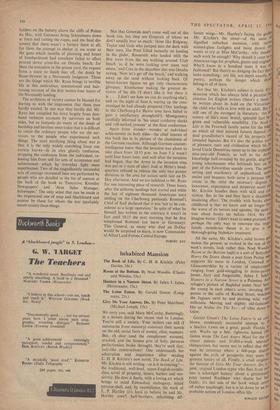Inhabited Mansion
limiters in a Narrow Street. By Jabra I. Jabra. (Heinemann, 15s.) Give Me Your Answer, Do. By Peter Marchant. (Michael Joseph, 15s.)
WE envy you, said Mary McCarthy, flatteringly, in a lecture during her recent visit to London. You're still a society. Your writers can still (I summarise from memory) construct their novels on the old, social facts of money, class, manners. But, oh dear (and the compliment wavered, cracked, and the lioness grin of holy, perverse perfectionism broke through), they're such tiny, lady-like constructions! One understands her admiration and impatience after reading C. H. B. Kitchin's new novel, The Book of Life. Mr. Kitchin is still writing—or is it re-creating?--- the traditional, well-bred, upper-English-middle- class novel of property, letters, butlers and sen- sitivity. He does it finely, with a loving art which brings to mind Edwardian mahogany, inlaid tortoise-shell, and, by resemblance, the work of L. P. Hartley (it's hard to believe he and Mr. Hartley aren't half-brothers, inhabiting dif-
ferent wings—Mr. Hartley's facing the garde,
dignified suburban mansion, with tur1et5' stained-glass fanlights and baize doors). 0E1, wants to cry at Miss McCarthy: why shouldn' Mr. Kitchin's the street—of the same 01' such work be enough? Why should it cater to American .rage for prophets, giants and ()Het Who'll know in a hundred years it was ow., fashioned? But there's no dodging the fact thatili' lacks something : not life, not depth exactly. 01„ poetry; perhaps the danger which shoal' belong to all of them.
Not that Mr. Kitchin's subject is timid. U.°. situation which has always held a peculiar fa' cination for English writers (there's a thesis 0 be written about its hold on the Victorians.),' the child who falls in love with an adult. But still one of the strongest in literature: the d's. covery of life's most brutal, splendid fact IV I, green and vulnerable sensibility. The Book u; Life is the Froxwell family name for the ledge on which all their leisured futures depend—ttl deaf grandfather's record of his property anij intended legacies. But it's also the golden won of pleasure, taste and civilisation which his bedg. loved Uncle Demetrius opens up to the orphan ' nine-year-old Francis; as well as the darlSr, knowledge half-revealed by the gentle, disgrace; young schoolmaster Who befriends him on ,t101 pier of the Edwardian seaside town. The pen setting and machinery of orphanhood, aunt uncles and bequests both serve a purpose (ti1 create in the child the necessary degrees 6, innocence, expectation and desperate need) ariv Mr. Kitchin handles them with skill and con. viction. But in the end they have a deadening; insulating effect. The trouble with books ahcilif childhood is that we know and no longer fe3. the worst of its terrors and agonies; the same „ true about books set before 1914. We cat; imagine worse: I don't want to seem prurient. bi perhaps the only way to renovate this tragic' faintly monstrous theme is to give it 111 thorough-going Nabokov treatment. All the same, Mr. Kitchin's solid brown 130,1 makes the present, as evoked in the rest of 01,5 week's novels, look rather thin. Noel Woodia$ Room at the Bottom (ugh) is a sort of Babyche Hurry On Down about a poet from Purley vl supports his muse in London, Cornwall ail, Gloucestershire by a variety of employmelw ranging from gold-smuggling to street-pa'll Sweet, fizzy and forgettable. Jabra I. Jabra Hunters in a Narrow Street is a Palestine Ara refugee's picture of Baghdad under Nun i Said.; the young in each other's arms, shouting the.,1 poems in the cafés of Rashid Street, watchilo the Jaguars swirl by and plotting wild, vaglf millennia. Moving and slightly old-fashiono' like an Arabic On The Eve: of what dawn %*4 know.
Gerald Green's The Lotus Eaters is an over blown, moderately successful attempt to dt' a Sinclair Lewis on a great, gaudy Florida.,11: sort. Works up a fine, righteous hatred (v"' Green wrote The Last Angry Man) for the ict cream palaces and $1,000-a-week chimpanzees, but seems not to reflect that the may be countries where a 600-page diatribe against the evils of prosperity may seem tY greatest luxury of all. Finally, a small original; the heroine of Give Me Your Answer, Do IS pink, virginal London typist who flees from rne," into a schoolgirl fantasy about a gentlemal pony named Bradshaw who shares her he.,, Oddly, it's this side of the book which conw off rather touchingly, but it is let down by an Or probable notion of London office life. RONALD BRY0e14


































 Previous page
Previous page